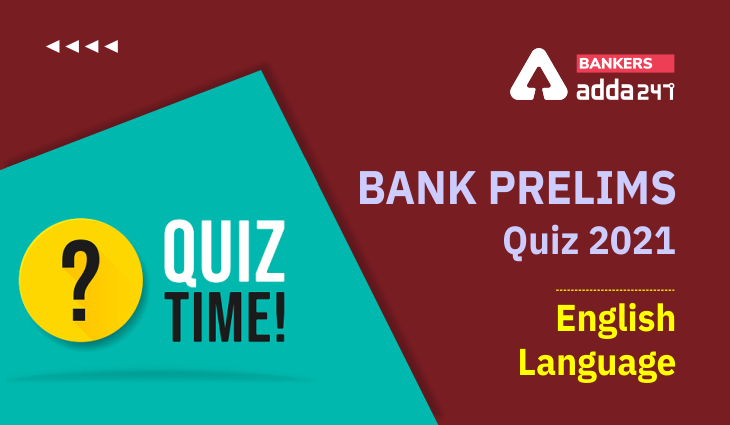
Directions (1-15): Read each
sentence to find out whether there is any grammatical or idiomatic error in it.
The error, if any, will be in one part of the sentence. The number of that part
is the answer. If there is ‘No error’, the answer is (e). (Ignore errors of
punctuation, if any.)
Q1. You may rest assured (a) / that
Madhav knows (b) / more than I (c) / in this matter. (d) / No Error. (e)
Q2.
Every one of us (a) / knows that given (b) / an option he prefers (c) / cold
drink than coffee. (d) / No Error. (e)
Q3. He
has no affection (a) / with anybody (b) / including the members (c) / of his
own family. (d) / No Error. (e)
Q4. I am glad (a) / to hear that (b) / you narrowly escaped (c) / being run
over yesterday. (d) / No Error. (e)
Q5. Both
the girls (a) / helped one another (b) / when both of them (c) / were in
difficulty. (d) / No Error. (e)
Q6. It
is universally true (a) / that an honest and hardworking (b) / man is always
(c) / a happy man. (d) / No Error. (e)
Q7. I
heard that Mohan (a) / as well as his parents were present (b) / in the wedding
ceremony (c) / of his brother. (d) / No Error. (e)
Q8. They
talked over (a) / the matter for (b) / many hours without (c) / arriving to any
decision. (d) / No Error. (e)
Q9.
Whenever I see her (a)/ I feel that (b) / she resembles to (c) / her deceased
mother. (d) / No Error. (e)
Q10. I
am accustomed with (a) / hard work and (b) / I generally do not (c) / get tired
easily. (d) / No Error. (e)
Q11. One of my friend (a)/ is both a
novelist (b)/ and a poet (c)/ of repute (d)/ No error. (e)
Q12. No sooner he left the office (a)/
than it started (b)/ raining heavily (c)/ to make him completely wet. (d)/ No
error. (e)
Q13.
While Xi said China (a)/ was committed to the denuclearisation of (b)/ the
Korean peninsula, he did not announce (c)/any new steps to squeeze the
reclusive regime(d). No error (e).
Q14. If one of the candidates choose
(a)/ to leave before the examination is over (b)/ allow him (c)/ to do so. (d)/
No error. (e)
Q15. Whom (a)/ do you plan to invite
(b)/ to your party besides (c)/ Mr. Rao and I? (d)/ No error. (e)
S1.
Ans. (a)
Sol.
‘You may be rest assured’ will be used in place of ‘you may rest assured’ as
‘may+ V1’ is used in active voice whereas ‘may +be + V3’ is used in passive
voice.
Ex. I
may assure you that you will succeed. (Active)
You may
be assured that you will succeed. (Passive)
S2.
Ans. (d)
Sol.
Use ‘to’ in place of ‘than’ as after ‘prefer’, preposition ‘to’ is used not
‘than’.
S3.
Ans. (b)
Sol.
Use ‘for’ in place of ‘with’.
S4.
Ans. (e)
Sol.
The sentence is grammatically correct.
S5.
Ans. (b)
Sol.
‘Each other’ will be used in place ‘one another’ as ‘one another’ is used for
two or more than two whereas ‘each other’ is used for only two.
Ex. The
three sisters love one another.
The two
sisters love each other.
S6.
Ans. (e)
Sol.
The sentence is grammatically correct
S7.
Ans. (b)
Sol.
‘was’ will be used in place of ‘were’ as if two subjects get connected with ‘as
well as’, ‘in addition to’, ‘like’, ‘unlike’ then the verb is used according to
the first subject.
S8.
Ans. (d)
Sol.
‘Arriving at’ will be used in place of ‘arrived to’ because ‘arrive at a
conclusion/ decision’ is used.
Ex. He
did not arrive at any conclusion.
S9.
Ans. (c)
Sol.
‘to’ will not be used after ‘resembles’.
S10.
Ans. (a)
Sol.
‘accustomed to’ will be used in place of ‘accustomed with’ because after
‘accustomed, habituated, addicted, committed, devoted, confined’, preposition
‘to’ is used.
S11. Ans. (a)
Sol. Use ‘friends’ in place of ‘friend’
as after ‘one of’, ‘either of’, neither of’, ‘every one of’, noun or pronoun is
always plural but verb is always singular.
Ex. One of the books is new.
S12. Ans. (a)
Sol. ‘had’ will be used after ‘No
sooner’ or ‘No sooner did he leave’ will be used as sentence starting from ‘No
sooner’, supporting verb is used before the subject.
Ex. No sooner did he reach the office
than his friend arrived.
S13. Ans. (e)
Sol.
There is no error in the statement.
S14. Ans. (a)
Sol. Use ‘chooses’ in place of ‘choose’
because noun or pronoun is used as plural after ‘one of’ but verb is always
used as singular.
S15. Ans. (d)
Sol. ‘me’ will be used in place of ‘I’
as pronoun used after preposition is always in objective case.
Ex. He likes Ram besides you and me.
Click Here to Register for Bank Exams 2021 Preparation Material




 English Quizzes For SBI PO Mains 2023 - ...
English Quizzes For SBI PO Mains 2023 - ...










